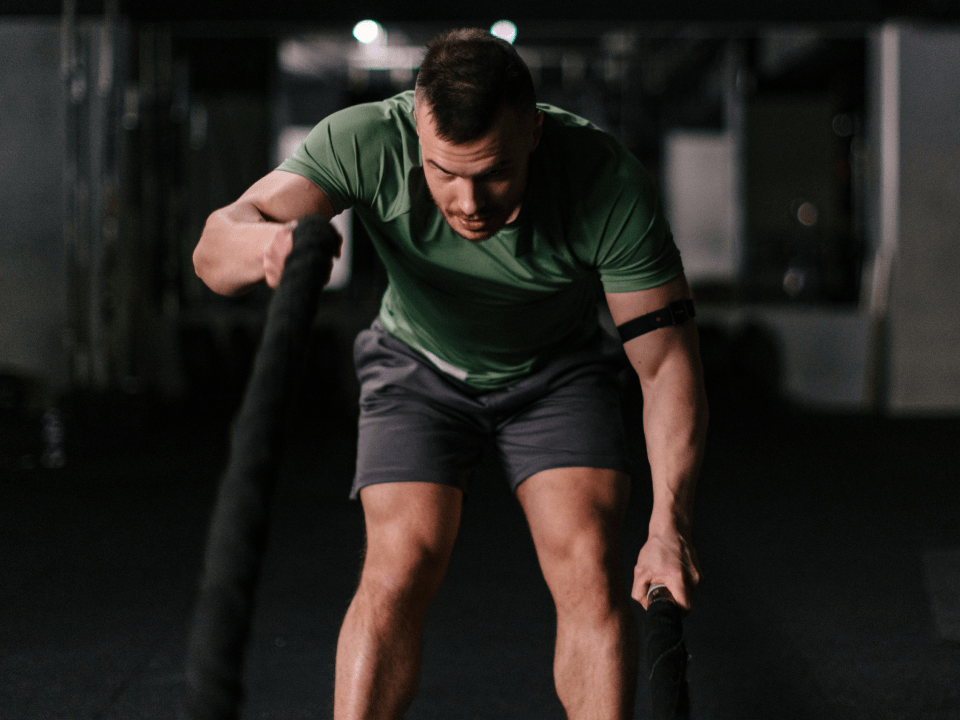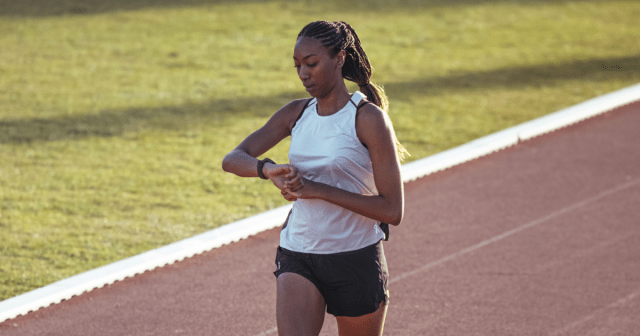Is caffeine the world’s most popular drug? According to the FDA, it is, with nearly 80% of US adults consuming it in some form daily – and for good reason. Caffeine is a powerful tool for temporarily improving your mental and physical performance. That’s why it’s commonly used by most athletes in their training and competition to ensure they perform at the peak of their capacity.
But is caffeine safe and healthy for us to combine with exercise? And what are some of the side effects that you should be mindful of when pairing them? In this blog, we look at how to calculate the ideal amount of caffeine, when and how to take it, and some of the pros and cons of combining it with your workouts and competitions.
What is caffeine?
Caffeine is a powerful stimulant and naturally occurring organic compound found in tea leaves, yerba mate, coffee beans, cocoa beans, kola nuts, and guarana berries. It belongs to a group of adenosine-receptor blockers known as methylxanthines which affect your central nervous system.
Adenosine is a chemical that builds up slowly in your body throughout the day, causing you to feel sleepy in the evening. So, caffeine temporarily blocks this process, which is why you feel so awake and alert after a cup of coffee. But consuming caffeine at the wrong time could disrupt your circadian rhythm, so always use it mindfully.
How much caffeine is healthy, and when should it be consumed?
The amount of caffeine you consume daily should be relative to your overall body weight, meaning that a smaller person will be more affected if they take the same amount as a heavier person. It’s generally accepted that the ideal dose of caffeine is between 3-6 mg/kg, especially if you are using it to boost your athletic performance.
Caffeine stays in your system for up to twelve hours, which means it can continue to impact your adenosine receptors long after taking it.
Caffeine stays in your system for up to twelve hours, which means it can continue to impact your adenosine receptors long after taking it. The initial energy surge comes around 30 minutes after consumption and lasts till approximately 90 minutes. However, caffeine’s impact continues after this, diminishing as time goes on.
After around three to seven hours (depending on your body weight and the amount you consume), the amount of caffeine decreases by half, referred to as its ‘half-life.’ So, if you had a coffee around noon, it’s likely that the caffeine would remain in your system, slowly diminishing till around 5pm, when you would have about half remaining. Around 10pm, this amount would have halved again, so the caffeine would be at its ‘quarter-life.’

Does exercise reduce the effects of caffeine?
These time frames are why you must be mindful when consuming caffeine, especially for use with exercise. Downing a coffee before your post-work run likely means the stimulant is still firing around in your system until after midnight, potentially disrupting your ability to fall asleep.
However, a small amount of research does indicate that exercise could reduce the lifespan of caffeine. The results from a 1991 study from the Hôpital Aiguelongue, France, that tested the effect of caffeine on heavy and light coffee drinkers during exercise suggest that it is metabolized slightly faster, reducing the half-life by around 50%. This effect could occur because when you exercise, your liver produces extra glycogen to fuel your muscles, perhaps causing the caffeine to be metabolized earlier.
Either way, it is best to pay attention to how caffeine affects you and learn when your ‘cut off’ time from it should be. For most people, this is around eight hours before they sleep, meaning lunchtime or early afternoon. It’s also important to remember there is caffeine in many products besides coffee and black tea. Dark chocolate and green tea can also contain high levels, while other products like kombucha and some painkillers contain smaller amounts.
Can caffeine encourage you to exercise?
If you’re reading this blog, you may enjoy working out or at least being physically active and are conscious of your overall fitness level. However, not everyone feels this way about exercise. Some people struggle to drum up much enthusiasm for it and, thus, can find it hard to make fitness a habit that forms part of their everyday life.
Of course, finding a way of being physically active that you enjoy will always be the best form of exercise because you’re more likely to stick with it and get more out of it. However, there is a way in which you could utilize caffeine to help you make it a habit.
Caffeine is a powerful reinforcing agent, which means it makes you feel positive about both the experience of consuming it and what you associate with its consumption. It’s why you may enjoy the bitter taste and smell of coffee. Measuring and brewing leaf tea in the morning may become an enjoyable ritual. You may even form an attachment to the cup that you drink your caffeinated beverage out of each morning.
Whatever it is, the positive reinforcement you experience from caffeine is why you enjoy these things. Combining your consumption of coffee with exercise could enhance your ability to think and feel more positively about your workout by linking the two.
It’s important to note that combining caffeine and exercise to increase your motivation isn’t advisable for everyone every day. It can sometimes cause what is known as dopamine stacking, which can impact your mental health.
Beware of dopamine stacking
It’s important to note that combining caffeine and exercise to increase your motivation isn’t advisable for everyone every day. It can sometimes cause what is known as dopamine stacking, which can impact your mental health.
One of the many benefits of exercise is that afterward, your body releases dopamine (the feel-good chemical in your brain) as a reward for you. Ingesting caffeine just before training significantly increases the dopamine your body releases after exercise, as seen in a 2019 study from Soonchunhyang University, Korea. The researchers tracked treadmill runners in two control groups who either had or hadn’t consumed caffeine just before their workout, and it showed that caffeine helped dopamine levels to spike after exercise.
This enhancement through a pairing or “stacking” of dopamine sources is, in some ways, a bonus. However, it’s also important to be mindful that the strong upwards boost you may feel from this increased amount of dopamine may, in turn, cause a drop in your mood as it wears off. So, pay attention to how you feel later or the following day after combining caffeine and exercise. If you’re in a low mood, be mindful of how and when you combine these two.
Does caffeine improve athletic performance?
Caffeine is a well-documented ergogenic aid, which means it’s a popular performance-enhancing tool that athletes use to increase their energy and recovery. It stimulates your central nervous system to temporarily improve your performance for 90 minutes (sometimes longer) after consuming caffeine.
That means many positive benefits when combing caffeine with exercise:
- You feel more alert and energetic thanks to increased levels of noradrenaline.
- Your response time is shorter, which helps in sports where you need quick reactions (such as baseball or tennis).
- Your VO2max is increased, expanding your capacity for high-intensity endurance performance, according to a 2021 study.
- Your ability to use fat as fuel increases, which helps you keep going during endurance events.
- Your levels of calcium ions within muscle cells are increased, which means your contractions will be stronger and more forceful during muscular strength exercises.
- Your speed increases by around one second per minute, according to a 1992 study, which adds up if you are competing in a long-distance event or professionally.
- Additionally, research suggests that consuming caffeine in the days after strength training reduces the painful effects of delayed onset muscle soreness (DOMs).
Types of caffeine for exercise
Rather than reaching for a cup of coffee or an energy drink before your workout, caffeine is usually consumed as a gel, chewing gum, or a pre-workout supplement for exercise. One of the main reasons for this is that it’s much easier to manage your dosage than with a barista-made coffee, for example, as caffeine content can vary from store to store.
Managing dose is especially important in endurance events, where you want to time your caffeine consumption to give yourself a steady series of boosts rather than having one big hit all at once. This approach is where something as simple as a caffeine gel is easy to carry on your run, cycle, etc. While a high-sugar energy drink might seem like another viable options, especially with the additional energy boost that sugar can provide for endurance events, they aren’t a great option. A carbonated drink combined with sugar and caffeine could cause gastric problems, and as they aren’t designed to release energy slowly, you could also experience a quick crash once the caffeine and sugar wear off. Instead, choose a sports drink that’s designed for exercise rather than ‘energy’.
Are there any disadvantages to combining caffeine and exercise?
When it comes to caffeine and exercise, the first thing you’ll probably be concerned about is your heart. After all, you’ve probably felt your heart pounding at some point after having a bit too much coffee, for example.
The reality is, in very high doses, caffeine does mildly increase your heart rate but for your average, everyday dose, the effect is very minimal if any. So, why does the beating of your heart sometimes feel stronger? It happens because caffeine can raise the level of epinephrine, also known as adrenaline in your body, which can cause an increase in blood pressure and contractility (the force of contraction of the heart muscle). These symptoms are more likely the reason why your heart feels like it’s pounding.
For most people, combining caffeine and exercise is ok. In fact, most studies report no change in heart rate with acute caffeine administration during exercise for adults, but do indicate elevated levels of blood pressure.
What this means is for most people, combining caffeine and exercise is ok. In fact, most studies report no change in heart rate with acute caffeine administration during exercise for adults, but do indicate elevated levels of blood pressure. So, if you do have a preexisting condition with your blood pressure, then it’s best to speak to your doctor or medical practitioner before attempting to combine them.
You should also be aware that some studies have indicated that combining caffeine and exercise can lead to elevated cortisol levels, which means you could feel more stressed afterward. High levels of this hormone long term can have many adverse effects on your body, such as a lower metabolism and increased cravings for fat and sugars.
It’s also important to note that your perceived rate of exertion is lower after caffeine, and your sense of pain is reduced, due to increased dopamine levels. So, it’s important to be aware that you could push yourself harder without realizing you are risking injury when combining caffeine and exercise.
Finally, remember that caffeine can never substitute for good nutrition, hydration, or proper training. It should only ever be used as a supplement and not necessarily every time you work out.
Tips for moderate use of caffeine by athletes
Here are some ideas for managing your use of caffeine when combining it with exercise:
- If you don’t already consume caffeine regularly, start with a low dose and gradually increase it over time. Doing so will allow your body to adjust slowly and help you understand your timing and tolerance. Never try using a full dose of caffeine for the first time on the day of a big race, as you won’t know how it will affect you.
- Track your sleep with Nightly Recharge™ to observe how caffeine may affect your rest and overall recovery at night.
- Wait at least 30 minutes after consuming caffeine to jump into your workout so that you can enjoy exercising during peak effectiveness.
- It’s important to remember that different forms of caffeine will be absorbed at different speeds, which is essential when timing your consumption for endurance. Some gels can take up to 45 minutes to kick in, whereas, with some gums, you will feel the effects almost immediately. So, experiment with products and how you respond to them before any big race or event.
- Some people like to go cold turkey on caffeine in the lead-up to a big race to increase their sensitivity to its effects and boost their performance on the day. The research around this suggests that it doesn’t necessarily provide that much of a benefit, but if you feel it helps, go for it.
Caffeine and exercise: a happy combo
There are a surprising number of benefits to using caffeine to boost your workouts or enhance your athletic performance – and minimal downside too. The key takeaway here is to be mindful of how much you take and when you consume it in relation to your exercise and sleep.
While caffeine is a powerful stimulant, its effects come down to the individual, so always take care to use it in the best way for you, your training, and your overall health. Remember, it can also aid you post-workout, mainly by decreasing the pain from any muscle soreness, so make it a part of your recovery process.
If you liked this post, don’t forget to share so that others can find it, too.
Or give it a thumbs up!
I like this article
Please note that the information provided in the Polar Blog articles cannot replace individual advice from health professionals. Please consult your physician before starting a new fitness program.





